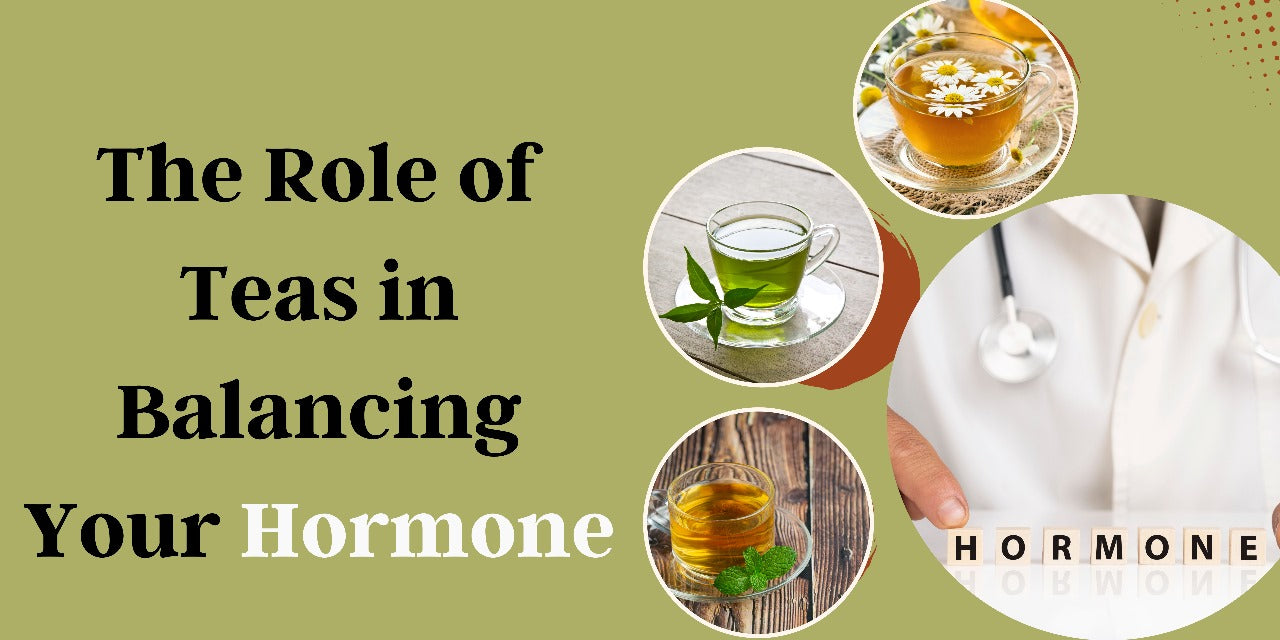In our fast-paced and stressful world today, it's vital to uphold hormonal balance for overall health and well-being. Hormones play a vital role in regulating various bodily functions, including metabolism, reproduction, and stress response. Imbalances in hormone levels can result in various health issues. While various factors can contribute to hormonal imbalances, including diet, exercise, and sleep, herbal teas have gained attention for their potential to help restore hormonal balance. In this article, we will explore the role of teas in balancing hormones and discuss some popular herbal teas that may offer benefits.
Understanding Hormonal Imbalances
Hormones are chemical messengers that regulate the body's physiological processes. They are produced by various glands in the endocrine system and are responsible for maintaining homeostasis. However, factors such as stress, poor diet, lack of exercise, and inadequate sleep can disrupt the delicate hormonal balance, leading to imbalances.
Chronic hormonal imbalances can have detrimental effects on overall health. They can contribute to conditions such as polycystic ovary syndrome (PCOS), thyroid disorders, infertility, mood swings, and weight gain. Therefore, it is essential to address hormonal imbalances to promote optimal health and well-being.
The Potential Benefits for Hormonal Balance of Herbal Teas
Herbal teas, also known as tisanes, have been used for centuries as natural remedies for various health conditions. They are derived from the leaves, flowers, seeds, or roots of plants and offer a wide range of potential health benefits. When it comes to hormonal balance, certain herbal teas contain compounds that may help regulate hormone levels and promote overall well-being.
It is important to note that while herbal teas may offer potential benefits, they should not be considered a standalone treatment for hormonal imbalances. It is always recommended to consult with a healthcare professional for a comprehensive approach to managing hormonal health. That being said, let's explore some popular herbal teas that have been traditionally used for hormone balancing.
Chamomile tea is well-known for its calming properties and is often used as a natural remedy for stress and anxiety. The stress hormone cortisol plays a pivotal role in the body's reaction to stress. While cortisol is beneficial in small amounts, chronically elevated levels can have negative effects on health.
By incorporating chamomile tea into your daily routine, you may be able to promote a sense of relaxation and reduce stress levels. This can indirectly support hormonal balance by helping to regulate cortisol levels. Enjoying a cup of chamomile tea in the evening can be a soothing ritual to wind down after a long day and prepare for restful sleep.
2. Green Tea
Green tea is renowned for its numerous health benefits, including its potential to support metabolic health. Hormones such as estrogen, progesterone, testosterone, and insulin play a crucial role in regulating metabolism. Imbalances in these hormones can contribute to weight gain or loss, fatigue, and other metabolic issues.
Green tea contains bioactive compounds called catechins, which have been shown to have positive effects on metabolism and insulin sensitivity. By incorporating green tea into your daily routine, you may be able to support healthy blood sugar levels and promote a healthy metabolic rate. Try unique blends like Cool mint Green Tea or Saffron Kahwa Green Tea for a flavorful twist on traditional green tea.
3. Peppermint Tea
Peppermint tea has long been used as a natural remedy for various women's health issues, including hormonal imbalances associated with conditions like PCOS. One of the key components of Peppermint tea is rosmarinic acid, which has been shown to have anti-androgenic properties.
In conditions like PCOS, elevated androgen levels can contribute to hormonal imbalances and symptoms such as acne, excess hair growth, and menstrual irregularities. Drinking Peppermint tea regularly may help reduce androgen levels and alleviate some of these symptoms. Consider adding Peppermint tea to your daily routine as part of a comprehensive approach to managing hormonal health.
Integrating Herbal Teas into a Balanced Lifestyle
While herbal teas can offer potential benefits for hormonal balance, it is important to remember that they are not a cure-all solution. Achieving and maintaining hormonal balance requires a holistic approach that includes a healthy diet, regular exercise, stress management, and adequate sleep.
A balanced diet that includes lean proteins, healthy fats, and fiber can support hormonal health. Avoiding processed sugars and incorporating nutrient-dense foods can help regulate appetite, metabolism, and mood. Furthermore, engaging in regular exercise can assist in regulating hormone levels and enhancing overall well-being. Engaging in activities like yoga, walking, or jogging can be beneficial for managing stress and promoting hormonal balance.
Prioritizing sleep is another crucial aspect of maintaining hormonal balance. Lack of sleep or exposure to artificial light at night can disrupt hormones like melatonin and cortisol, which regulate sleep-wake cycles and stress response. Creating a bedtime routine and ensuring a restful sleep environment can contribute to hormonal health.
It is also important to be mindful of environmental factors that can disrupt hormonal balance. Avoiding endocrine disruptors such as tobacco smoke, pesticides, plastics, and certain personal care products can help maintain hormonal health.
Conclusion
Incorporating herbal teas into your daily routine can be a holistic approach to supporting hormonal balance. Chamomile, green tea, and peppermint tea are just a few examples of herbal teas that may offer potential benefits for hormonal health.
However, it is important to remember that herbal teas should be used as part of a comprehensive approach to managing hormonal imbalances. Consult with a healthcare professional before incorporating herbal teas or any other supplements into your routine, especially if you have any underlying health conditions or are taking medications.
By adopting a balanced lifestyle that includes a nutritious diet, regular exercise, sufficient sleep, and stress management, you can optimize your hormonal health and promote overall well-being. Take the time to prioritize self-care and make mindful choices for a healthier and more balanced life.




